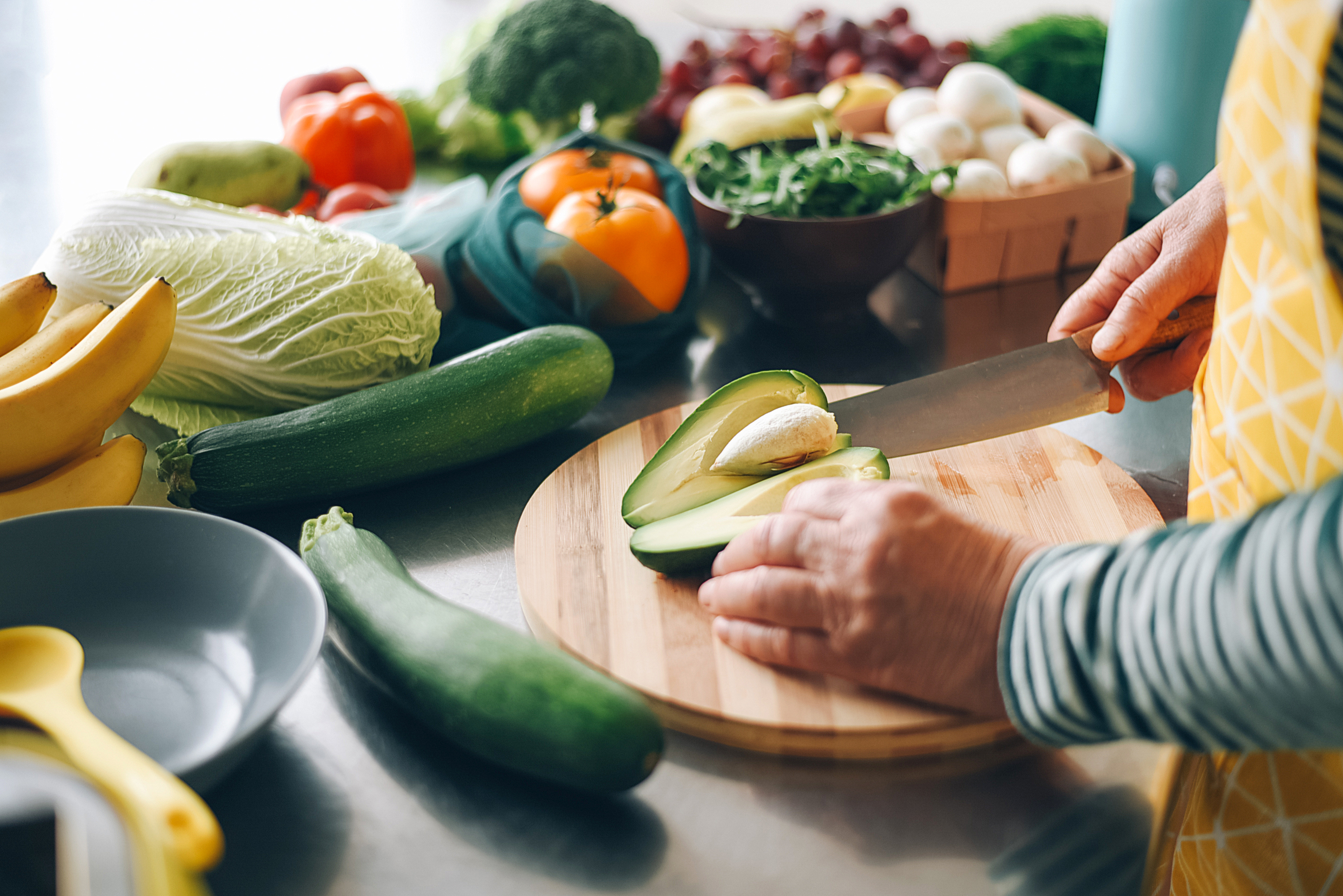How much weight can I lose in a month in a healthy way?
Nutritionist reveals how much weight you could really aim to lose in a month, why healthy and sustainable weight loss is best, and how to do it


How much weight can I lose in a month in a healthy way? A month might only be four weeks but if you're looking to make changes to your lifestyle habits for long-term progress, it's a good idea to set time-managed and achievable goals. The only mistake to avoid will be trying to make too many changes too quickly.
When trying to lose weight, many people go for the all-or-nothing approach. A total lifestyle overhaul or no change at all and it's fair to say this way of doing things can be tempting, as you have the motivation to start and the desire to stick to your plan, but it rarely stands the test of time.
For instance, many people try and learn how to lose a stone in a month or weight in a week. But as well as being just a plain unpleasant way to spend your time, research suggests this type of 'crash dieting' can do more harm than good. So, how much weight could you lose in a month doing so healthily and sustainably? And what's the best way to do it? Here, woman&home speaks to an expert personal trainer and weight loss specialist to reveal all.
How much weight can I lose in a month in a healthy way?
The amount of weight you can healthily lose in one month will depend on various characteristics, including age, starting weight, calorie deficit, and other lifestyle factors like exercise habits. For example, those with a higher starting weight will naturally burn more calories during intense exercise, so may find it easier to stay in a calorie deficit to lose weight over one month.
A safe and sustainable rate of weight loss is about one to two pounds (0.45 to 0.9 kilograms), explains personal trainer and weight loss specialist Amanda Place. "This equates to approximately four to eight pounds (1.8 to 3.6 kilograms) per month," she explains, which is just over half a stone in weight.
When it comes to the term 'weight loss' though, it's important to work out exactly what we mean. When we use the term, what we probably mean is 'fat loss' as weight loss just refers to the number on the scale - which is made up of everything in your body, including muscle, water, tissues, organs, bone, and whatever's inside your digestive system from last night, as well as fat. Fat loss means losing some of the fat mass in your body.
It's a distinction that explains why it's so important to try and lose weight slowly, sustainably, and healthily. While restrictive diets, otherwise known as 'crash diets', may offer results in the short-term, it's not going to be fat loss. It's going to be weight from water and muscle, which will come right back when you return to eating and exercising as you were - with the potential of an upset metabolism along with it if you do it too often.
Sign up to our free daily email for the latest royal and entertainment news, interesting opinion, expert advice on styling and beauty trends, and no-nonsense guides to the health and wellness questions you want answered.

Instead, experts recommend switching to a sustainable approach of getting into a calorie deficit. This involves burning more calories than you consume every day, a process that can be achieved in many different ways but is essential (at least in the beginning) to lose weight.
It's also a process that's helped by the fact adult women burn an average of 1800 calories per day just through normal bodily processes, like sleeping, breathing, and even eating. Additional calorie burn comes from regular movements, like walking around the house, and most people reduce or change their calorie intake alongside this. Working out, like doing yoga every day or taking up walking as a workout, can also help.
Some people choose to count calories, using a calorie-counting app for instance, while others aim to be less restrictive and just alter their overall lifestyle habits for the better - opting for naturally protein and fibre-rich foods (see the Mediterranean diet for more information) and plenty of exercise. Either way will work for some people and not others, so it's important to do what works best for you.
No one should be forced to lose weight or pressured into it. Losing weight isn't the be-all and end-all of being healthy. Weighing a certain amount and looking a certain way certainly doesn't contribute to the value of who you are as a person. However, choosing to change your habits to lose weight is also a valid decision to make if that's what you want to do. Here, Place explains why it's so important to do so healthily.
Why you shouldn't try to lose weight too quickly
There are two main reasons to opt for healthy, sustainable weight loss over quick results: 1. The process of changing your diet and exercise habits will be more enjoyable and manageable. With fewer drastic changes you're less likely to feel like you're 'missing out' on certain parts of your life, like socialising in a certain way. 2. You'll find yourself changing your habits in the long term as well, which means your progress will continue and stand the test of time.
"Sustainable weight loss focuses on making gradual and realistic changes to your diet and lifestyle," explains Place, who is also the founder of Sculptrition. "This approach is more likely to lead to lasting results because it encourages healthy habits that you can maintain over time. Crash diets often result in rapid weight loss followed by rapid regain once normal eating patterns resume." It's why many people often find themselves supposedly in a calorie deficit but not losing weight.
But another reason for making small lifestyle changes over shock switches is the impact weight loss has on your muscle mass. "Crash diets often lead to muscle loss along with fat loss, which can slow down your metabolism. Sustainable weight loss emphasises preserving lean muscle mass through proper nutrition and strength training, helping to maintain a healthy metabolism."
Tips for healthy, sustainable weight loss
1. Don't make your calorie deficit too large
If you are counting calories then a calorie deficit between 500 and 750 calories is enough to see changes in your weight loss progress, research from multiple institutions including Seoul National University Bundang Hospital finds. Many people find themselves dieting but not losing weight when they opt for more than this as their plan has become too restrictive.
The way we lose weight changes over time: the more you get into your process, the more your deficit will have to change to continue seeing results. However, if you're looking for something to aim for, this is a good place to start.

2. Embrace your meal prep
You may have heard of a Sunday reset being the best way to get ready for the week ahead but did you know it could also be the best way to plan your weight loss?
"Weekend afternoons are ideal for meal prep, a strategy that’s proven to aid weight loss and one that I recommend to my clients," says Place. "When you have a plan, you’ll be less likely to eat on impulse, which means fewer frozen pizzas and impromptu takeaways."
It also means you're more likely to get all your nutrients in. "Pre-planning your meals also helps you be more mindful of nutrition and getting in proteins, healthy fats and complex carbs," she says.
If you're not sure where to start, the trainer recommends batch-cooking veggies, proteins and whole grains so you can easily mix and match grain bowls for quick, nutrient-dense meals. Try it for the month and see how it goes - if it doesn't work for you but you like the idea, and the budget can stretch, you could try one of the best meal delivery boxes to have meal-prepped food delivered to your front door.
3. Eat more protein
Staying full while reducing or changing the amount you're eating is often a struggle for those new to losing weight. Opting for some of the best high-protein, low-calorie foods will be the way forward, since you can consume more of them while staying in your deficit because they add up to fewer calories at the end of the day. Being high in protein means you'll stay feeling satisfied and less likely to snack or overeat later on in the day.
Protein helps us maintain muscle while losing weight as well, which is also very important and something we'll go on to explain here.
4. Increase your step count
As well as burning almost 1800 calories through just being you every day, we burn calories through movement that doesn't count as exercise. Technically speaking, this is called non-exercise activity thermogenesis (NEAT) and it includes activities like walking (to the shops, around the office, walking the dog, not hiking etc.), gardening, standing up cooking in the kitchen, and other similar movements.
One way to boost this calorie burn is by focusing on your step count. Research shows that the need to 10,000 steps a day to lose weight is a bit of a myth. There's nothing wrong with this round number but doing anything over 7,500 steps has actually been proven to have the same effect by researchers at Pennington Biomedical Research Center.
Taking the stairs instead of the lift, opting to walk to work over driving or public transport where possible, and taking the long way around to get somewhere are all useful and practical ways to increase your step count and all easy changes to make to your daily routine over a couple of weeks.

5. Work out in the morning
Should I exercise in the morning for weight loss? We hear you ask the question and there are certainly benefits to switching up your evening spin for a morning jog over the next month.
While not everyone is an early riser, morning workouts could be the key to weight loss. "Starting your day with a workout can support your metabolism for more efficient muscle building and serve as a pick-me-up to help you feel alert and ready to tackle the day," says Place. "You’ll also get it out of the way and have a sense of accomplishment that keeps you motivated to stick with healthy habits the rest of the day."
6. Incorporate some strength training into your routine
Strength training may not burn as many calories in the moment as cardio activity, like cycling or running, but there are many other benefits of strength training when it comes to losing weight.
One of those is muscle maintenance. Not only do we naturally lose muscle as we get older, thanks to natural ageing processes like menopause, but losing weight can mean we lose some muscle mass along with fat. Weight training, whether that's gym classes, classic weightlifting, or Pilates for strength training, and eating plenty of protein prevents this from happening.
As noted, a month isn't a huge amount of time but if you are looking to lose weight then strength training is one of the best things you can do - especially as a strength training for weight loss programme will be the perfect length of time to help you reach your goals over the next few weeks.
7. Prioritize your sleep
We know that good sleep is important for our health but if you're asking the question 'how much weight can I lose in a month', then learning how to sleep better is even more important.
"Just like scheduling your meals, picking the ideal time to get into bed can help you give your body the time it needs to recover and ultimately lose weight. Not getting enough sleep can put a dent in your weight loss efforts, as hormone shifts cause a surge in hunger and cravings," says Place. "Stick to a bedtime routine that allows for seven to eight hours of good quality sleep."
Not only that but if you're going to bed in the early hours of the morning, chances are you're not going to be getting up a couple of hours later for a morning workout.

Grace Walsh is woman&home's Health Channel Editor, working across the areas of fitness, nutrition, sleep, mental health, relationships, and sex. She is also a qualified fitness instructor. In 2025, she will be taking on her third marathon in Brighton, completing her first ultra marathon, and qualifying as a certified personal trainer and nutrition coach.
A digital journalist with over seven years experience as a writer and editor for UK publications, Grace has covered (almost) everything in the world of health and wellbeing with bylines in Cosmopolitan, Red, The i Paper, GoodtoKnow, and more.